Trezor
Maximize Your Crypto Experience with Trezor Suite: A Comprehensive Guide
Is ‘Trezor Suite’ the key to better cryptocurrency management? Discover the simplicity behind setting up and using this comprehensive tool, as our guide discusses features, security, and the overall convenience of integrating Trezor Suite into your financial toolkit.
Key Takeaways
- The Trezor Suite is an integrated platform that facilitates secure and efficient management of digital assets across web, desktop and mobile applications, with support for a wide range of cryptocurrencies.
- Setting up a Trezor device is designed to be straightforward and includes key security steps like verifying the hardware’s integrity and creating a recovery seed for backup during initialization.
- Trezor Suite actively focuses on enhancing security and privacy through various features like hardware confirmation of transactions, privacy modes with CoinJoin, and allowing users to contribute to its development and report security vulnerabilities.
Exploring the Trezor Suite

Trezor Suite is a comprehensive platform, providing an arsenal of features to manage your digital assets securely and efficiently. This all-in-one app is designed with functionalities like coin management, transaction tracking, and even asset trading. With over 8000 coins and tokens supported natively, it’s no surprise that Trezor Suite is becoming a go-to choice for both beginners and advanced users alike!
Now, we will explore further the components that constitute the Trezor Suite.
Web Application
Take control of your cryptocurrency assets right from your browser with the Trezor Suite web application. Its user-friendly interface allows you to set up and start managing your assets within minutes. Whether you’re a seasoned pro or a crypto newbie, this web app ensures a seamless user experience, allowing you to efficiently manage your crypto assets and account information.
Moreover, the app also provides options to adjust your Trezor device settings with ease, making device management accessible from the web.
Desktop Application
The Trezor Suite offers a powerful desktop application that goes beyond its predecessor, Trezor Wallet. This desktop version enhances user privacy with features like:
- Tor, providing a stable connection and protection from phishing attacks
- CoinJoin, offering additional privacy by mixing transactions
- Support for Taproot addresses
Available for Windows, macOS, and Linux, this desktop app offers the following features:
- Transparent security with open-source software
- Ability to update your Trezor firmware directly
- Multiple account management
- Custom fee settings
The recommended desktop application is every bit as robust as you need it to be.
Trezor Suite Lite
Trezor Suite Lite serves as the mobile companion to the desktop/web version, providing users with a seamless experience across devices. It ensures access to Trezor Suite’s key features while on the go. It mainly functions as a Portfolio Tracker, allowing you to monitor transactions and generate receiving addresses on the go. Although it currently supports a limited number of cryptocurrencies, Trezor regularly updates to include new coins, allowing you to track your portfolio anytime, anywhere.
For Android users, Trezor Suite Lite also allows the connection of your Trezor hardware wallet to your mobile device, making use of mobile wallet functions.
Setting Up Your Trezor Device

The initial step to accessing secure and efficient cryptocurrency management is setting up your Trezor device. This process is straightforward, starting with downloading and verifying the Trezor Suite from the official Trezor website to ensure software authenticity and security. Once you connect your Trezor device to your computer, the Suite guides you through the initial setup, including installing the firmware, creating a new wallet, and setting a unique PIN for protection against unauthorized access.
Choosing Your Trezor Model
The Trezor Model One offers a balance of simplicity and security, making it an excellent option for cryptocurrency beginners. For those seeking additional security measures, the Model T comes equipped with a touchscreen to guard against keyloggers and malware. The choice between the durable ABS plastic casing of the Model One and the robust ABS+PC plastic casing of the Model T depends on your preference.
With the Model T powered by a powerful ARM Cortex-M4 processor, your choice ultimately depends on your needs and preferences.
Unboxing and Initialization
Unboxing your Trezor device is just the beginning of your crypto journey. Upon unboxing, users must check for any signs of damage or tampering, such as compromised holographic seals. Once you’ve ensured the integrity of your new Trezor, you’ll find the following items inside the box:
- The device
- A USB cable
- A getting started guide
- Two recovery seed cards
- Four stickers
A key step in the initialization process is generating a recovery seed - a backup that ensures access to your private keys.
Connecting to Trezor Suite
Connecting your Trezor device to the Trezor Suite is a breeze. All you need is a Trezor Model One or Model T, and a USB cable. Trezor Suite is a free application compatible with Windows, macOS, and Linux, offering enhanced security and control over your assets.
The easy, user-friendly setup process can be completed within minutes, ensuring that you can start managing your crypto assets as soon as possible.
Managing Your Crypto Assets
After setting up your device, you can begin managing your crypto assets with Trezor Suite. This comprehensive environment allows you to:
- Send and receive transactions, facilitating the secure movement of your crypto assets
- View your transaction history
- Manage a portfolio of different cryptocurrencies through Trezor Suite, effectively streamlining your digital asset management.
Creating and Managing Accounts
Trezor Suite supports various account types, including:
- Taproot
- Segwit
- Legacy Segwit
- Legacy for Bitcoin

Each type comes with distinct address formats and features that aid in transaction management and user privacy. Whether you’re managing one cryptocurrency or multiple, Trezor Suite allows you to create multiple wallets for your assets, with up to 10 accounts of each type per cryptocurrency allowed.
Plus, the ability to generate multiple receiving addresses maximizes user privacy and facilitates payment tracking.
Sending and Receiving Transactions
Trezor Suite simplifies the process of sending and receiving transactions. To receive crypto, simply follow these steps:
- Navigate to the Accounts tab
- Select the appropriate cryptocurrency
- Click ‘Receive’ to generate your receiving address
- The receiving address can even be displayed as a QR code, making it easier for the sender to scan and send the transaction
- Rest assured, your Trezor hardware wallet doesn’t need to be connected for you to receive cryptos
- The generated address is permanently associated with your account and can be used anytime.
Portfolio Overview
Stay on top of your crypto portfolio with Trezor Suite’s portfolio overview feature. This real-time tracker allows you to:
- Monitor the performance of your assets in one place
- View a graphical representation of your asset distribution and historical value
- Display assets in your preferred fiat currency or cryptocurrency
Accessible through both the web and desktop apps, portfolio tracking ensures you stay updated with your asset performance, no matter where you are.
Enhancing Security and Privacy
Trezor Suite is designed with your security and privacy in mind. Every transaction made using Trezor Suite requires explicit confirmation on the Trezor hardware wallet, ensuring your assets are safe from unauthorized transactions. Trezor Suite also incorporates strong encryption and protection mechanisms, including firmware verification during setup and firmware signature checks at each connection.
In this article, we will examine the security and privacy features in greater detail, and for more information, you can refer to the kb section other resources.
Backup and Recovery
The backup and recovery of your Trezor device are crucial for securing access to your private keys. During the initial setup, your Trezor device prompts you to create a new wallet and generates a backup recovery seed. This seed must be handwritten and stored securely offline to ensure access to the funds on your Trezor.
The Trezor Model T even offers an advanced feature known as Shamir Backup, allowing you to split your backup into multiple shares for enhanced security during the recovery process.
Privacy Mode
Trezor Suite offers numerous privacy-enhancing features, including Coinjoin and Coin control. The discreet mode in Trezor Suite blurs out sensitive data like account balances, revealing the information only when you hover your mouse over it.
Coinjoin adds a layer of privacy to your Bitcoin transactions, making it more difficult to track your transaction history. Coin control allows you to manually select specific coins for transactions, enhancing privacy when sending funds.
Reporting Security Vulnerabilities
Trezor encourages users to report security vulnerabilities in Trezor Suite responsibly. Sensitive information regarding vulnerabilities should be encrypted and submitted via email to ensure security.
Trezor values responsible disclosure, assuring researchers that they will not face legal action for disclosing vulnerabilities without committing fraud against users or the company.
Customizing Your Experience
Trezor Suite offers various options for you to personalize your experience. We will now discuss how you can adjust settings and connect with third-party apps to customize Trezor Suite according to your needs.
Changing Display Settings
Customize your Trezor Suite interface to suit your personal style. Choose between a light theme or dark mode for your preferred visual experience. You can even customize the currency display to show values in your chosen fiat currency or cryptocurrency.
Plus, language settings can be adjusted, allowing you to operate the application in your native language or the default one.
Updating Firmware
Keeping your Trezor device secure and up-to-date is crucial, and regular firmware updates are a significant part of that process. Trezor Suite and devices regularly prompt users to update firmware to protect against known security exploits.

The Suite provides step-by-step instructions to guide you through the process, ensuring your device remains secure and up-to-date.
Connecting with Third-Party Apps
Expand your Trezor device’s functionality by connecting with compatible third-party apps and services. Trezor hardware wallets support integration with a variety of third-party cryptocurrency wallets and online services, broadening the scope of their functionality. Whether you need access to additional cryptocurrencies or want to harness features like decentralized applications (dApps), staking, and support for multisignature transactions, third-party applications can cater to your needs.
Contributing to Trezor Suite Development
If you’re a developer or a tech-savvy user, you can contribute to Trezor Suite’s development. Your contributions can take many forms - from following development guidelines to submitting bug reports and feature requests.
We will now delve into how you can contribute; additionally, we will provide guidance throughout the process.
Following Development Guidelines
Adherence to the Conventional Commits guidelines is necessary when contributing to the Trezor Suite codebase. These guidelines ensure concise and informative commit messages, providing a clear context for each change made to the codebase. Each pull request must also include a changelog entry to document the changes made, aiding in tracking modifications over time.
Submitting Bug Reports and Feature Requests
Trezor rewards individuals for reporting security vulnerabilities through its bug bounty program, paying out bounties in Bitcoin. Providing comprehensive descriptions, proofs of concept, and your contact information is important when reporting bugs or suggesting enhancements.
You can report issues directly on GitHub at https://github.com/trezor/trezor-suite/issues.
Joining the Community
The Trezor community forum is an active platform where users can engage in discussions, share experiences, seek assistance, and receive support from both the community and Trezor representatives.
The development team actively acknowledges issues, provides updates on ongoing investigations, and offers solutions, reflecting a strong engagement with the community.
Summary
Trezor Suite offers a comprehensive and secure solution for managing your digital assets. From setting up your Trezor device to customizing your experience, you have the power to control and enhance your cryptocurrency portfolio. Now that you understand the features and functionalities of Trezor Suite, it’s time to embark on your crypto journey with confidence and expertise.
Frequently Asked Questions
What does Trezor Suite do?
Trezor Suite is a software designed for managing cryptocurrency, offering security for online trading and portfolio tracking. It is commonly used by both novice and experienced investors for managing crypto assets.
Can I use Trezor without Trezor Suite?
Yes, you can use Trezor without Trezor Suite by using an increasing number of independent cryptocurrency wallets and online services, although Trezor Suite is considered the best solution for managing your crypto assets.

Can Trezor still be hacked?
Trezor can still be vulnerable to physical hacking attacks, and there is a risk of theft if a fake device is introduced with a wireless transmitter to capture PINs. It's important to create a PIN for your Trezor to enhance its security.
How do I know if my Trezor Suite is legit?
You can ensure the legitimacy of your Trezor Suite by never entering your seed words on a website and by safeguarding them. The authentic Trezor Suite will only accept the device if the installed firmware is correctly signed by SatoshiLabs.
How can I set up my Trezor device?
To set up your Trezor device, download and verify the Trezor Suite from the official website, then connect your device to your computer and follow the on-screen instructions for the initial setup. This process includes installing firmware, creating a new wallet, and setting a unique PIN for security.